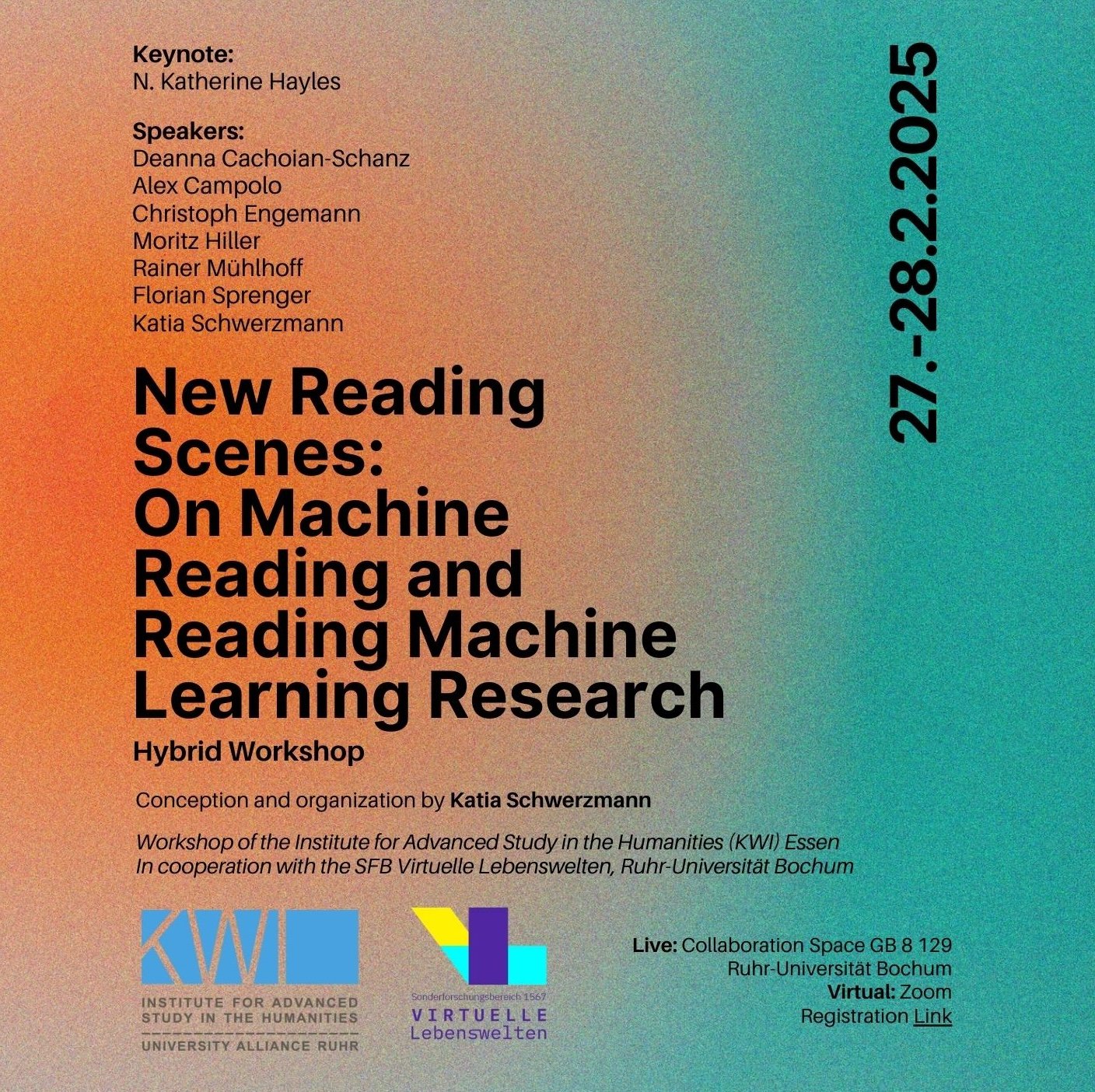
Introduction to the Workshop “New Reading ScenesOn Machine Reading and Reading Machine Learning Research” (KWI, RUB)
The task at hand as I envisaged it for these two days is to analyze the new reading scenes emerging with large language models (LLMs) and the research practices that surround them. How is reading transformed in terms of modes, methods, but also valuations, when machines read for us, that is, “interpret” content, summarize text, propose essay questions? What does the format of the machine output do to our understanding and valuation of reading? What do we read of a text, a philosophical position, a source in a foreign language, when we read it through machine reading? Is this reading through the machine a reading with or a reading from the machine? That is, do we form an assemblage of shared cognition and co-constitution of meaning-making when we think and read through an LLM? Or have we become the necessary supplement to machine learning models?

To Moderate
To moderate—the word resounds as a soft imperative. I hear its appeasing nature, the implicit authority the moderator is given to bring instances into dialog and at the same time to pacify their relationship, to soften the passage between the one and the other. Secondly, I can’t help but connect the moderator to my object of study: the medium. A moderator is a medium of sorts, with diverse techno-culturally determined ways of operating and performing. Ideally, she has gained techniques allowing her to be neither too present nor too absent in the exchanges she moderates; similar to a medium diffracting rays of light, redirecting them, slowing them down, so their spectrum may become perceptible to the senses. But does she want to slow down or redirect anything? A medium can also be an in-between that connects what is separated. Or it can provide a frame for what is happening by which it constrains and conditions it. Prima facie, there seems to be a certain distance, a detachment in a moderator’s performance, as she frames the discourse of others without having to speak in her own name. On the other hand, my mind also wanders to the referee in a mixed martial art fight, my sport of predilection. In that case, the moderator quickly moves between the blows, avoids them, yet intervenes when a fighter is down before too much damage is done. She has an obligation to fairness, to render what is due to each part. It carries more responsibility and engagement than it might initially seem.

Nancy’s Law of Touch and Its Violation in the Undercommons
What Nancy names here “the law of touch” is the acknowledgement that there is only contact with the separation, and thus, the differentiation of what comes into contact. Yet, the law of touch, as I interpret it, is not solely descriptive. It also entails an ethical dimension, by insisting on the impenetrability of the touched body—in other words, its inviolability. Additionally, it is an acknowledgement of the irreducible difference of what comes into touch. Through touch, bodies converge indefinitely without ever overcoming their constitutive separation—this space in-between that refutes the immediacy that touching seems to promise.

“One Unique You”: Passing and DNA-Testing as Ethnotechnological Apparatus
We understand passing in the double meaning of passing for someone or something else, but also passing through a border. The presupposition of this presentation is that the condition of possibility for passing and being mistaken or misrecognized relies on a conception of “identity” that functions as a property in the double meaning of what properly defines a subject and what belongs to this subject at the exclusion of someone else. We read this in the philosophical discourse of enlightenment where subjectivity is understood as sovereignty over the self, as self-possession; but also in the analysis of the slave codes by Cheryl Harris. Passing cannot exist without presupposing firm identities against the background of which someone or something does or does not pass. While identity categories tend to be essentializing, since they are grounded on the idea of property as a possession, we witness a trend to overcome this concept of identity for instance in intersectional discourse but also in the posthumanist discourse. What a human is in comparison to an animal or a machine has become increasingly contested. However, we will show that with genomic technology, among other kinds of identifying technologies—indeed, what technology does not serve the purposes of identification and targeting nowadays?—with genomic technologies, it becomes increasingly difficult to pass, to stay hidden, or to mask one’s identity. Especially for human beings targeted as undesirable—minorities, refugees, the unemployed—it becomes almost impossible to move beyond the borders of what comes to define an individual. All the newly-created technologies go in the direction of forbidding any kind of passing for or passing through. While new technologies are based on the principle of the identification of individuals, machines may slowly become the only beings able to pass for something else then what they are. Indeed, machines are allowed to pass for human like in the case of widely used chatbots replacing the workforce, but humans have to constantly prove that they are not machines like in the case of captcha identification procedures.

The Posthuman and the Shift Towards Ethics
In posthumanist theories, the political—that I understand as the practice of deciding in common with regard to the commons—shifts toward questions of ethics. This shift is present in critical posthumanism and transhumanism alike, whereas they have very little in common—besides the term “posthuman” that they construe widely differently. I find it intriguing that two widely different conceptions of posthuman subjectivity, the transhumanist one that reiterates the autonomous subject of liberal humanism, on the one hand, the critical posthumanist one marked by its questioning of autonomy and sovereignty, on the other, both lead to a privileging of ethics as a way of understanding sociality.

Individualization Refusal: An Introduction
By working, thinking and writing together on this parallel path, we have been refusing the individualization of academic labor. We have been seeking ways to interrupt the habitus of working against one another, of distinguishing ourselves from the others. We refuse, for a moment, to compete in the violent scarcity economy that is the academe, where it always seems that there are too many of us and that we are never enough.

Non-poisonous Gifts
Since this exchange started, I have increasingly felt put in a place of debt towards you, due to the amount of thoughtful, brilliant, joyful thinking each and everyone of you provided with care. Those are true, non poisonous gifts, given out of engagement and desire for justice as the kind of truth we strive for and around which we all unite, us, refusers. Never in my intellectual life have I encountered such generosity without any expectations of return on investment. It started within my group “Nothing Happening Here”. This generosity inscribes in our relationship an obligation to each other that cannot be neutralized, unlike in psychoanalysis, where the monthly, weekly, daily cash payment of what we owe to the therapist creates a moment of great alleviation: symbolic debts can be paid.
